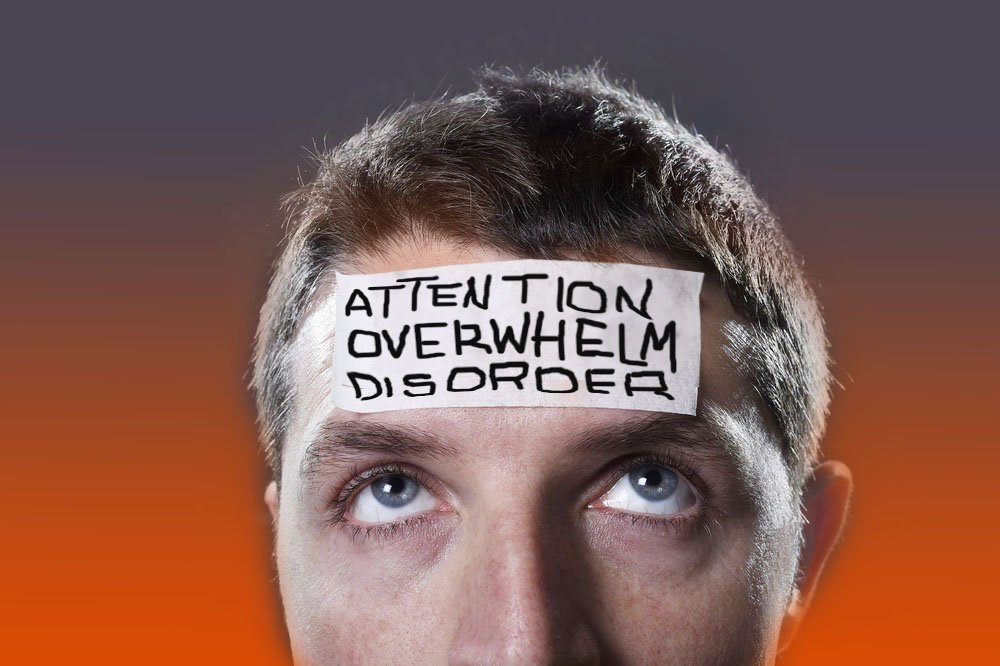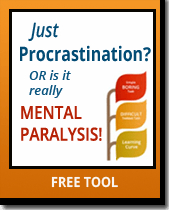
Overwhelm keeps 88% of ADD / ADHD Adults from getting started, according to “The Procrastination Survey.”
When I decided to put out my second survey on ADHD Procrastination in four years, I honestly didn’t expect to see much change from the “Getting Started Blues” Survey I had sent to my readers in 2012.
The most important finding at that time was a validation of my theory that far more adults with ADD / ADHD were stuck in mental paralysis than procrastination. Rather than having a problem with attitude and motivation, they were more often actually unable to start when they wanted to.
This month, four years later, I sent out “The Procrastination Survey.” It was shorter, and named the many different reasons I knew ADD / ADHD adults had trouble starting. I asked people to simply identify which of these presented a “BIG PROBLEM” for them.
Once again, there were far more people stymied by mental paralysis types of roadblocks than procrastination (which would just be “unmotivated to start” or “don’t feel like it.”)
But I saw a different trend this time in the nature of the paralysis.
The amount of Overwhelm was — overwhelming! Issues related to distraction and focus played a much higher role than before in keeping people stuck. And difficulty in planning came in third place, showing up much higher than before.
SURVEY RESULTS
Here are the results of The Procrastination Survey, in descending order. The percentage refers to the percent of ADD / ADHD survey responders who considered that challenge to be a “BIG PROBLEM” in getting started.
- Overwhelm – 88%
- Focus / Processing (hyper-focus & distraction) – 82%
- Planning – 78%
- Decision Making / Prioritizing- 69%
- Disorganization – 67%
- Unmotivated (procrastination) – 66%
- Perfectionism – 64%
- Shame- 55%
- Fear / Anxiety – 51%
- Time Management – 39%
- Ambiguity / Lack of clarity – 31%
HYPER-FOCUS & DISTRACTION
The real surprise for me was the extent to which problems of focusing and mental processing had overtaken procrastination. The challenges I’d listed that had addressed this problem included:
- Hyper-focus – not being able to pull away from what you were doing
- Distraction in the environment – too quiet or too noisy to concentrate
- Mental processing on the task –needing to receive the information in a different way (visual, auditory or hands-on)
These issues come down to a person being unable to focus their brain to start or stick with the activity.
I believe much of the change is a result of the increased amount of tech-related stimulation available at our fingertips. Since my initial survey in 2012, smartphone ownership in the U.S. has almost doubled. The distracting elements of social media, chat apps, photo apps, games, streaming videos, and countless other enticements in our mobile devices has created a shortened attention span that has been reported on and studied quite a bit in the media.
The drain on productivity has been a problem for everyone, not only those with ADD. But the distraction problem has become exponentially heightened in the ADD / ADHD population.
Not only are we more easily distracted to begin with, but our hyper-focus mechanism locks us in to these non-essential activities and makes it very difficult to simply pull out and turn to the task or project we had intended to do.
INABILITY to PLAN
Difficulty in Planning had risen dramatically in the ranks of roadblocks to getting started. In 2012, only 22% had considered inability to plan as one of their top 3 issues. But this time it was named as a real problem by 78%.
I doubt that people have become innately less able to plan than before. Rather, I think that it’s become more obvious to people that their inability to plan is keeping them down.
When you spend more time in distracted time-wasting activity, you have fewer hours left to be productive. So it’s even more important that you know how to use that time wisely.
If you don’t know how to break down that project, or figure out where to start, your brain will likely go straight to overwhelm! Which might send you right back to avoidance / distraction.
I'll develop training this month on ways to break this cycle of Overwhelm – Distraction – Inability to Plan.
In the meantime…
I received so many insightful comments in the survey, with people sharing their personal roadblocks that are especially valuable to me, as an ADHD Coach and program developer. It’s important to anyone reading about these difficulties that you realize you aren’t alone in your struggle.





Cara
I think all the distractions in life don’t help people but I also think that life has become very complicated for everyone, that it becomes hard to start any where. Also, I’ve noticed that people never seem to learn how to plan at any point in their lives. It is just assumed that they can plan.
For example, my children were handed planners in school to track their assignments but there was no instruction about how to create a plan or use it in a way that works for them, it was just assumed it was obvious but my children won’t do it. I had the same problem in school, I struggled with word problems until my physics teacher showed me how to solve problems by breaking them down, I still use the method he taught me to this day to solve my problems but I struggled in school until grade 11 when I learned this method. Planning is a skill that can be learned but has to be taught along with the power of using routine.
Bonnie Mincu
Cara, you are so right! Planning is not taught in school… and neither are any study skills, for that matter. It isn’t even taught in business school, where knowing how to plan is so important for any career in business.
This survey has made it clear that providing strategies and training in PLANNING will need to be a priority. And it’s not a “quick fix” topic, there are many components to it, including being able to estimate how long things take to do. Luckily, that’s a skill that can be learned as well.
T. Brown
I have no difficulty planning and breaking tasks down into smaller chunks. (I’m convinced that my participation in Girl Scouts helped me develop planning skills.) Where I run into difficulty is when I have to figure out how much time each step takes and how to fit everything into my day along with all the other things I must do; self care, time with family, unexpected interruptions caused by stuff other people need me to do, etc. I have timed how long daily tasks take so I can better plan my time, a suggestion I got from your web site. Thank you! But it’s the unexpected interruptions that really throw my plans out of whack and my line of work is full of them!
My other issue is when I am close to the end of a project and then just-not-being-able-to-finish. Not so much with work, but with achievement in personal goals and projects. Too often, self care and time with my family have taken the hit, but I am trying to change that. But it means that then I can’t get as much done, and trying to dig out of the debris of my ADD life seems like something that will never happen.
Bonnie Mincu
You’ve identified the dilemma facing most people who work and have a family (or just want a fulfilling personal life!) Too much to do, not enough time.
For those constant interruptions, you could try using the same time-tracking that you used for daily tasks.
The fact that you’re able to finish projects at work says you know what it takes to finish, but you’re not applying what you know to your own personal goals.
Andi
Great article! I find that I get overwhelmed even with household chores, let alone anything else. Every task seems top priority and my brain seems to scramble or freeze which leads to my attention being scattered all over the place and I get very little done which leads me to feel shame for being unproductive. I don’t currently have a Job but many of my past ones ended up with me being unable to keep pace with the workload and sales targets etc..
I’d be interested to know if there are any others out there who struggle with even the relatively simple routine type stuff.
Bonnie Mincu
Andi, that cycle of OVERWHELM -> DISTRACTION -> SHAME that you describe is just what I’m developing some training for. And it’s VERY common for people with ADD / ADHD to struggle starting everyday tasks. In my training back in 2001, it was commonly said that ADD people typically found it easier to think through complex problems than to do ordinary (boring) things like housework or filing. Many of us probably became entrepreneurs because we did better at running a company than starting at the bottom of the ladder of an organization.
Regarding doing simple tasks, the survey results this time showed that:
Personally, I’d rather create a whole training program than have to vacuum or clean. That “easy stuff” is hard!
Andi
Phew..Thank goodness it’s not just me who finds everyday routine tasks hard going..I’m quite relieved and very grateful to you Bonnie for being generous enough to make this data available ..I shall eagerly await more news of your upcoming programs..cheers!
Linda V
I have recently been in one of my valleys where I am not only overwhelmed, but mentally paralyzed, so thank goodness someone showed me this article! I am certainly unproductive at home, resulting in shame and embarrassment which seem to de-motivate me even more. The inability to prioritize tasks and then to commit and begin, gets me so far behind that I am chronically late for everything.
The expression “She couldn’t be on time if her life depended on it,” really scares me!! Lol!
Bonnie Mincu
Linda, you just illustrated a perfect example of why ADHD solutions can be so complex. Your initial lack of unproductivity at home led to 3 different challenges shown on the Procrastination Tree Tool:
… plus the additional challenge of chronic lateness!
All the more reason it’s so important to pinpoint the reason for the INITIAL lack of productivity that led to this spiral. For simple home-related tasks, it’s often plain old procrastination of the “I just don’t feel like it” variety. If that’s the case, the best solutions are ones that make it more entertaining, using rituals, or timer games to induce a bit of challenge.
Watch for Procrastination training coming up in September!
Caroline
You had helped me tremendously at the NYU workshop handouts, then as a coach for several months ,then in email info through recent yrs. I discontinued coach appt cause funds dived radically when business crashed. But I hope to utilize you services in the future.
My huge overwhelm gets worse when the creativity part goes into overdrive. I feel more add than the H in ADHD. Also when I do not exercise regularly. Or eat sugary food. What stops me is when I get foggier and foggier about one thing, then everything, it’s a shutdown. Procrastination is not a huge problem due to using a calendar book, which u started me with yrs ago Bonnie. When is your next NYU course???
Bonnie Mincu
Caroline – Great to hear from you! It’s funny JUST when I read your question about my NYU seminar, I got a phone call from someone else asking me the same thing. Unfortunately, after 10 years, NYU has gone in a different direction and is no longer offering this type of personal development seminar in its Continuing Ed. division. But I’ve been giving my more extensive training programs on Procrastination and ADHD Productivity for the last several years. Procrastination Transformation is coming up in September, and I’ll be giving a free live webinar in a few weeks. Make sure you’re getting my emails to hear about it. (Subscribe to the blog or download the Procrastination Tree Tool to get on my list.)
In ADHD Getting Started Blues Survey, Overwhelm Wins Again
[…] than procrastination. It seemed everyone claimed to be overwhelmed wherever they turned. My “Procrastination Survey” that year showed overwhelm as the top contender for keeping people from starting things, followed […]